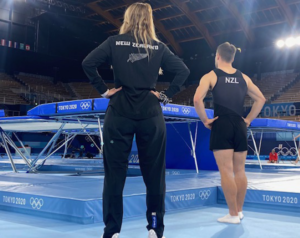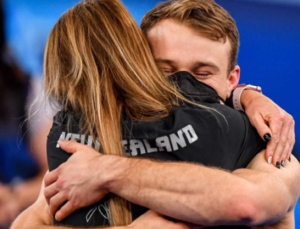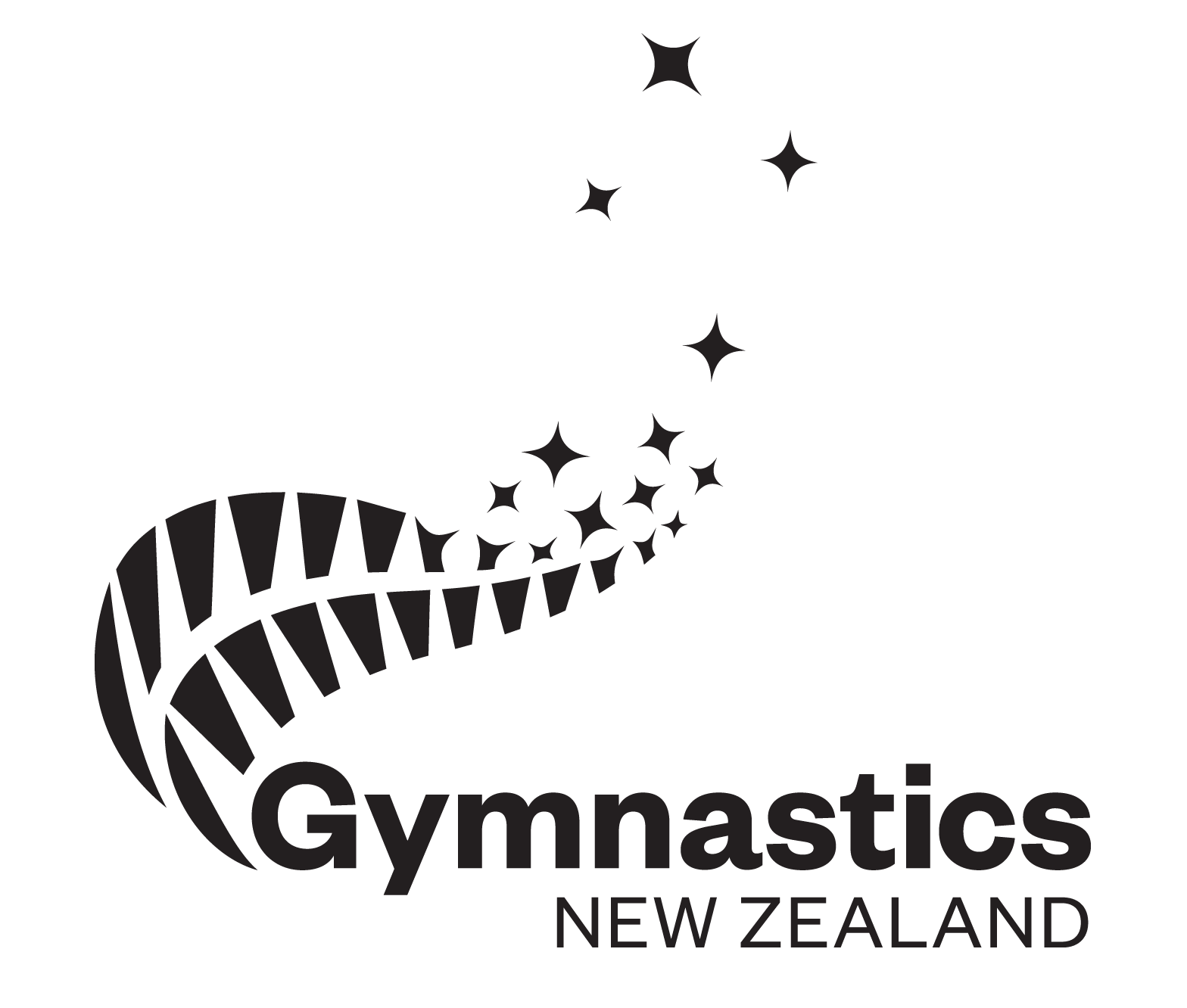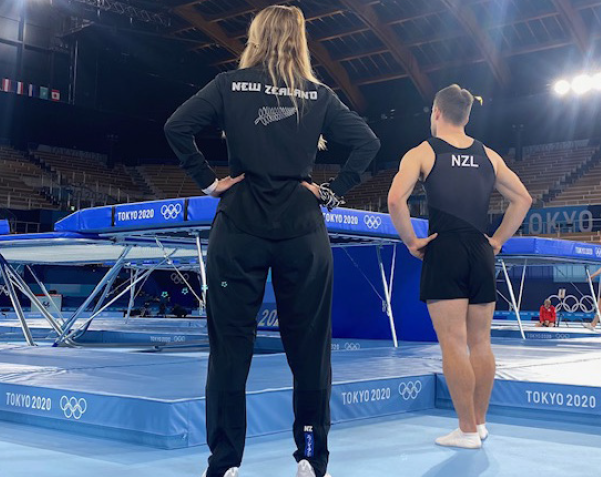Thank you to Sports Performance Coach NZ, who wrote and originally published the below article.
“We get it wrong by focusing on winning.”
At first glance, these words don’t seem like they would come from a high performance coach, especially the coach of a current world champion. But listening to Angie Dougal, it makes complete sense, and she has the results to prove it.
Dougal is a former world champion trampolinist, her competitive career spanning more than a decade, so she knows some things about what it takes to compete at the highest level. “It can feel a little bit cliché, but coaching and sport is about making good humans,” she says. “We have to release the hold on outcome. As a coach, I don’t enjoy athletes getting worked up and sad and angry because they didn’t win, that’s not what I am in sport for. It’s not what the athlete is in sport for. We do sport because it’s fun.”

Dougal has been coaching Dylan Schmidt, the current men’s trampoline world champion and Olympic bronze medallist, since he was six. Her coaching journey began aged 12, fuelled by an innate desire to serve. She’d known from an early age she wanted to be a teacher, and coaching was an extension of that. Coaching courses from beyond her own sport opened her mind to more than just technical performance. “I was learning about energy systems, sports psychology and strength and conditioning,” she tells. “All of that was emerging knowledge. Once I learned it, I knew that I could’ve been a much better athlete myself – less injured, better able to deal with the pressure of international competition. I wanted to teach the next generation about all of the things that make you able to perform, not just do the sport.”
While completing her teaching degree, she learned about positive psychology and child development, realising that it could – and should – translate to coaching as well. “More and more kids were wanting to come and train with me, because we were having fun as well as getting better. That didn’t go down well with the ‘old school’ but I’ve always liked to do things differently.” Following a four-year stint teaching in the UK, Dougal and her husband, also a gymnast, decided to set up their own club, as international
exposure had proven that New Zealand was behind the rest of the world. “We decided to structure our club the way we thought a national programme should be structured, from the grassroots, because I knew I couldn’t wait for the country to do it,” she recalls. Extreme Trampolining was born, soon becoming the strongest club in the country, a full time venue operating a professional set up.
It was there that she first met Schmidt. Twenty years on, she’s seen him grow, be challenged and succeed, but her philosophy has never changed – a well-rounded person is a well-rounded athlete. “The shift in Dylan in recent years has been in his mindset; he knows who he is. We’ve worked really hard on his identity; he’s a son, a friend, a hunter, and he also does tramp. His sport doesn’t define him.” She credits this approach for his success at the Tokyo Olympics. “The day of his final, he said ‘Thank you for being here. I don’t care what the outcome is, I’ve just enjoyed the buildup.’ That’s when I knew he’d medal. He released the hold on the outcome.”

And so did she. While she was happy for him when he secured the bronze, she detaches her self-worth from his performance. The real emotion came when he hugged her and thanked her for coming back to coach him, referring to their journey together. Dougal had stepped away from high performance coaching for a time to focus on her family, and herself. “I tell athletes and coaches that they have to make
sure they have their priorities right, so it’s important that I do that myself,” she recalls. “When I get back to my values and priorities, I know I can give the best of myself to others.
I’ve learned to say ‘no’ when I need to. Dylan understood that, and even when he asked me to come back, I made it clear that he wouldn’t be my priority. He agreed, because he understands the importance of identity and having other things away from sport.”
During her hiatus, she took up coaching her daughter’s football team. “What did I know about football? Absolutely nothing,” she laughs. “But I know coaching, and I knew that we’d have a really nice time together. We ended up winning the league, not because we were any good at football, but because we made training fun, and we figured out the football stuff. The girls loved coming to training, and then they would practice themselves during the week, so they got better. It’s not rocket science.”
Schmidt is currently based in England, training with their national squad for a long period of European competition leading into defending his world championship title. Dougal only travels for certain events, so is coaching from a distance. “I trust him,” she says. “One of my big pillars is letting athletes be independent and have autonomy over their own training. Dylan makes his own decisions, and my job at this stage is to remind him that he has the tools he needs to achieve, and what that means in terms of the
work he needs to do.” This is all leading to Paris 2024, following a formula that they know works for Schmidt. “The fact that we keep learning, train hard and know we’ve done the work allows for us both to be calm, and that’s what allows the performance to happen at those big events.”
Being based with another national programme is dualpurpose for Schmidt. A team environment adds a social element to his training as an individual athlete, and it also gives him exposure to other coaching and training methods. “We both are able to learn from those environments, what we like in their programmes, and what we can learn from their mistakes,” Dougal says. She’s also brought coaches
to New Zealand, such as Canadian Dave Ross, the most decorated trampoline coach in history, to keep their trainings fresh and focused.
In her time away from coaching Schmidt, Dougal took up a role at the New Zealand Rugby Players Association supporting women’s rugby. This role gave her the opportunity to see and advocate for the value of the athlete voice, which she then translated into a coaching context. “Being a coach is great, but it can be isolating and can break people,” she says. “Coaches don’t have a voice in the same way athletes do, but I believe there needs to be something to support them.”
The Sport Performance Coaches NZ (SPCNZ) network appealed to Dougal for that reason. “I want it to be a network of good people who are good coaches,” she says. “Somewhere you can go for support, or a vent as needed, a group that you can rely on, particularly for female coaches to have a voice. And a group that’s not afraid to hold each other accountable. That’s really important. If that’s done well, then the professional support side of it might not be as necessary, just there as a back-up.”
She’s honest in saying that she’s not 100% sure what success for SPCNZ looks like, but ties that to the reality of being in sport. “It will need to be an evolution, which is what we do in coaching all the time. We try something, we learn, we fail fast, we adapt and get better.”
In her eyes, SPCNZ has the opportunity to drive positive change in high performance environments. “Good coaches change lives. If we can create a groundswell of good coaches with good support, we’ll create better environments for our athletes who feel so much better and love coming to training. That’s where the performance comes from.”

